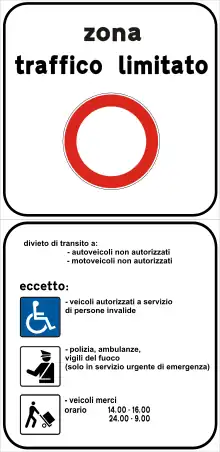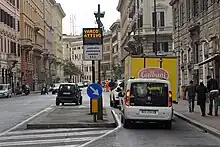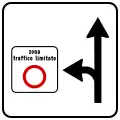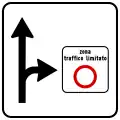Limited traffic zone
Limited traffic zone (LTZ) is type of restricted traffic area found in many historic European city centres where non-residents and unauthorized vehicles are prohibited from driving at certain times.[1] These areas are relatively abundant in Italy, where they are called zona a traffico limitato (ZTL), but they also exist in Spain, Portugal, France and Poland with different names. Around 350 Italian cities have LTZs, and 250 have low-emission zones (LEZs), usually enforced with camera surveillance.[2] They help protect historic city centres from excessive traffic, which would otherwise make the city less attractive. They can also be aimed at limiting pollution levels or at increasing administrative revenue by paying an urban toll.[3]

In most Italian LTZs (ZTLs), vehicles transporting people with disability are allowed when displaying the appropriate badge. As Article 47 of the Italian Traffic Code (Codice della Strada) defines bicycles as vehicles, cycling is only allowed if specified on the road sign. Unauthorized movement of vehicles in a ZTL is punishable by a fine under Article 7(14) in conjunction with the relevant city ordinance, and the fine is between 83 and 332 euros.[4]
In 2009 the city of Florence issued an average of 1,253 traffic tickets a day, for an annual revenue of 52 million euro. The fines tripled over the previous ten year period. In the same year revenues from traffic fines in Milan were 81 million euro. About 53% of these fines come from LTZ violations.[5]
Italian signage
Entrance signs

The sign indicating the start of the ZTL is composed of a series of panels. The first, mandatory, has a square shape and contains the "no vehicles" sign and the written zona traffico limitato. Below this signal other panels are placed are positioned according to the type of ZTL. Panels are provided to indicate the period of validity, exceptions or limitations to the prohibition, report the presence of an electronic gate or provide telephone numbers to obtain information on the ZTL.
To allow drivers to immediately understand if the ZTL is active, municipal administrations often integrate road signs with electronic displays indicating, for example, ZTL attiva (ZTL active) or ZTL non attiva (ZTL inactive).
Notice signs
The warning signs of a ZTL are not expressly provided for in the regulations implementing the Italian Traffic Code and therefore are created in analogy to the warning signs of urban intersection.[6]
These signs must in any case contain the symbol of the ZTL, if possible integrated with all the panels present on the sign placed at the access gate. However, given that very often it is not possible to reproduce all the indications present on the main signal, the Ministry of Transport has established that the warning sign cannot contain more than two panels, to be chosen between:
- a time slot panel and a vehicle category panel
- two panels relating to two categories of vehicles (see Symbols in Italian traffic signs)
Examples of generic warning signs, without supplementary panels:[6]
Implementation in other countries
In October 1988, Kraków implemented an LTZ in its city center.[7]
In October 2012, Nantes was the first French city to adopt the concept of an LTZ in the city center.[8]
In June 2022, Newcastle upon Tyne introduced School Streets with similar restrictions.[9][10]
Navigation software support
Most satellite navigation software does not avoid LTZs.[11] Waze added support for LTZs in select cities in 2018.[12]
Controversies
Since foreign tourists are unaccustomed to ZTLs, and since most navigation software does not alert drivers to avoid them, infringements for entering a ZTL are a particular point of concern for this group. ZTL infringement notices often reach them by post several months after their stay in Italy, sometimes more than one year later[13] sometimes with an administration fee added by the car rental company. Unauthorized entry into a ZTL is the most frequent fine received by drivers of rental cars, much more than speeding or parking fines.[14] Many tourists are unaware of ZTL regulations, or misinterpret signage at entrances.[15] The process is considered dubious by tourists and consumer associations because the signs indicating the prohibition of access to the ZTL are often not very visible and written in Italian.[16] In addition, the price of fine is high, at around 100 euros.[1]
See also
References
- "Limited traffic zone in Italy". European Consumer Centre Germany. 15 July 2022. Retrieved 2 August 2022.
- "Italy". Urban Access Regulations in Europe.
- "Calendario Storico 2017" [Historical Calendar 2017] (PDF) (in Italian). Comune of Priolo Gargallo. 2017. Archived (PDF) from the original on 7 March 2022. Retrieved 2 August 2022.
Tra gli scopi di questo provvedimento si annoverano: ... aumentare le entrate amministrative anche con l'eventuale pagamento di un pedaggio urbano
[The purposes of this provision include: ... increasing administrative revenues also with the eventual payment of an urban toll] - "Nuovo codice della strada" [New Traffic Code]. Article 7, Decree No. 285 of 30 April 1992 (in Italian). Italian law. Archived from the original on 14 February 2022. Retrieved 8 August 2022.
- "Too much of a bad thing". The Florentine. February 12, 2009. Retrieved February 20, 2021.
- "Linee guida per la regolamentazione della circolazione stradale e segnaletica nelle zone a traffico limitato" [Guidelines for the regulation of road traffic and signs in limited traffic zones] (in Italian). Ministry of Infrastructure and Transport of Italy. 28 June 2019. Archived from the original on 12 April 2021. Retrieved 30 July 2022.
- "Krakow - Limited Traffic Zone". Urban Access Regulations in Europe.
- "Opération ZTL : zone à trafic limité" [ZTL Operation: Limited Traffic Zone] (in French). Nantes Métropole. 15 October 2014. Archived from the original on 6 April 2016.
- "Newcastle - Limited Traffic Zone". Urban Access Regulations in Europe.
- "Parent traffic banned from Newcastle school drop off area". BBC News. 19 May 2022. Retrieved 13 August 2022.
- "A guide to Italy ZTL Zones". Questor Insurance. 21 October 2021. Retrieved 2 August 2022.
- "Driving Smarter and Greener with Waze for ZTL & Crit'Air". Medium. 9 August 2018. Retrieved 2 August 2022.
- Elliott, Christopher (2010). "When in Rome, Watch Your Driving". Frommer's. Retrieved 1 August 2022.
- "Come funziona la normativa delle ZTL vigente in Italia" [How does the current ZTL legislation in Italy work?]. Fleet Magazine (in Italian). 28 August 2019. Retrieved 2 August 2022.
- "Driving in Italy: Traffic Fines and Toll". European Consumer Centre Bolzano. Retrieved 1 August 2022.
- "L'Italie met ses touristes à l'amende" [Italy fines its tourists]. 60 millions de Consommateurs (in French). 27 July 2010. Archived from the original on 24 April 2012.




.jpg.webp)
.jpg.webp)


